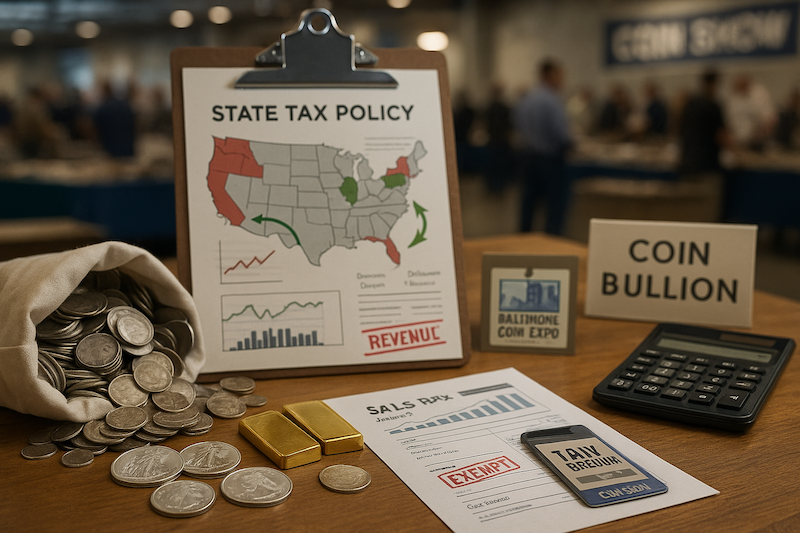TL;DR: When states repeal coin and bullion sales tax exemptions, they frequently collect less total tax, not more. Real-world cases—Florida (1990s), Ohio (2005 repeal, later reinstated), and Louisiana (2016 suspension)—show cancelled coin shows, dealer exits, and lost hospitality and payroll taxes that outweigh the expected sales-tax gains. New repeals in Maryland (effective July 1, 2025) and Washington (effective Jan. 1, 2026) risk repeating that history unless lawmakers account for behavioral shifts—buyers going out of state, purchasing ETFs or vaulted metals, or simply pausing activity. Trade data and legislative testimony back this up, including the NCBA (formerly ICTA) 2016 dealer survey on traffic, cross-selling, and payroll effects.
Why the debate matters now
Two major coin/bullion markets just lost their carve-outs:
- Maryland: Governor Wes Moore signed the budget bill repealing the exemption for coins and precious-metal bullion, effective July 1, 2025, with a narrow exception for convention sales at the Baltimore Convention Center.
- Washington: Lawmakers repealed the state’s long-standing exemption, with sales tax to apply Jan. 1, 2026 (under SB 5794). Some coverage also notes impacts alongside B&O treatment.
Proponents argue repeals raise revenue. But history suggests static estimates—which assume no change in behavior—overstate collections, while dynamic reality (buyers and dealers adapting) erodes them. The National Coin & Bullion Association (NCBA) has chronicled these swings and actively briefs legislatures on what actually happens.
“When everyone assumes buyers won’t change behavior, forecasts miss the target,” an NCBA briefing notes, pointing to repeated overestimates in fiscal notes and the need to measure cross-category taxes (hospitality, payroll, and taxable merchandise).
What history shows: three instructive case studies
Florida (1990s repeal)
- After Florida eliminated its exemption, 100+ coin shows were reportedly cancelled or moved; the Orange County Convention & Visitors Bureau estimated $60 million in annual hospitality sales disappeared—sales on which sales tax would otherwise be collected.
- Mechanism: shows relocating to exempt states depress hotel/restaurant receipts and local tax collections.
Ohio (repealed 2005, reinstated effective 2017)
- In 2005, Ohio repealed its exemption. Contemporary coverage documented dealer closures and show cancellations.
- By 2016, lawmakers reinstated the exemption (SB 172), recognizing competitive leakage to neighboring states.
Louisiana (2016 partial suspension; 2017 restoration)
- During a budget crunch, Louisiana suspended numerous exemptions, including bullion/numismatics, cutting the carve-out and temporarily taxing at 3%. Pushback and measured impacts led to reinstatement efforts; by mid-2017, lawmakers ended sales tax on bullion/coins.
Takeaway: Where exemptions were repealed or suspended, total state/local collections often fell, due to migration of shows and sales to friendlier jurisdictions, plus collateral damage to hospitality and employment-driven taxes.
The data behind the dynamics (NCBA/ICTA survey)
A widely cited 2016 national dealer survey (covering 2015 activity) documented how exemptions alter in-state activity:
- Dealers in exempt states report far higher in-state retail sales than those forced to charge sales tax (the magnitude varies by state; testimony and fiscal notes use this to recalibrate fiscal estimates).
- Cross-selling matters: increased traffic tied to exemptions boosted taxable merchandise (supplies, jewelry, antiques). On average, these taxable sales replaced about two-thirds of the “lost” sales-tax collections from exempting bullion/coins.
- Payroll feedback: in Michigan, a treasury study (cited in testimony) found ~38.5% of payroll spending falls on sales-taxable items; more shops and jobs → more tax.
This helps explain why static fiscal notes can miss: they tally foregone sales tax on bullion/coins but ignore offsets from taxable goods, payroll-driven consumption, and tourism.
Coin and bullion sales tax exemptions vs. repeals: what actually changes
Buyer behavior
- Arbitrage: Buyers in taxable states can avoid sales tax by buying out-of-state (e.g., Delaware, Oregon, Montana), purchasing vaulted metals (RCM/Perth/Royal Mint vaults), or shifting to ETFs/mining shares—all options that divert sales and tax base. (These behavioral channels are central to NCBA’s legislative testimony.)
- Events: Major shows relocate to keep transactions tax-efficient, dragging hotel/restaurant receipts with them—Florida’s $60M/year loss is the classic example.
Dealer behavior
- Footfall & inventory: With a tax penalty, dealers see fewer large in-state transactions and may downsize or relocate to nearby exempt states. Ohio’s 2005–2016 experience is a cautionary tale.
What Maryland and Washington risk (and can still fix)
- Maryland (from 7/1/2025): Repeal passed with a narrow convention exception for the Baltimore Convention Center. Expect leakage to Delaware, Pennsylvania, Virginia, West Virginia and to vaulted/ETF channels. Hospitality around smaller shows will still feel a pinch.
- Washington (from 1/1/2026): The repeal means buyers can pivot to Oregon/Montana or remote options. If B&Oburdens remain, dealers face a double hit (margin compression + demand loss).
Policy guardrails: If states insist on repeal, they can blunt damage with threshold exemptions (e.g., exempt over $1,000investment purchases), show-specific carve-outs, and data-driven annual reviews—approaches seen in prior legislative cycles. (Maryland’s file history even shows bills aimed at expanding exemptions in other years.)
Pros and cons (balanced view)
Potential benefits of repeal
- Immediate, visible sales-tax collection on in-state bullion/coin transactions.
- Simpler messaging (“everything is taxable”) for auditors.
Documented drawbacks
- Leakage to other states and products (ETFs/vaulted metals) → lower total tax.
- Lost events & tourism (hotels/restaurants), as in Florida’s $60M/year hospitality hole.
- Dealer exits & job losses, later prompting reinstatement (e.g., Ohio 2016).
A quick comparison: repeal vs. exemption (what state ledgers actually see)
| Metric | With exemption | After repeal |
|---|---|---|
| In-state bullion/coin sales | Higher (buyers prefer local) | Lower (shift to out-of-state/ETFs/vaults) |
| Taxable cross-sales (supplies, jewelry, antiques) | Higher (shop traffic up) | Lower (traffic down) |
| Hospitality (shows, conventions) | Higher (events anchor locally) | Lower (events relocate/cancel) |
| Payroll and related sales tax | Higher (more dealers/jobs) | Lower (consolidation/relocation) |
| Sales tax on bullion/coins | Foregone | Collected on remaining sales |
| Net effect | Often neutral to positive (broader base) | Often negative (narrow base) |
Backed by NCBA/ICTA survey results and multiple state case studies.
The finance angle: margins, spreads, and why static models fail
Bullion retailing runs on thin margins. A 4–6% sales tax can erase the economic case for local purchase on larger tickets, especially when alternatives (ETFs, out-of-state vault delivery) are a click away. Static fiscal notes rarely model:
- Elasticity: Large-ticket buyers are highly price-sensitive net of tax.
- Substitution: Metals exposure can be replicated without sales tax (financial products), shrinking the taxable base.
- Secondary taxes: Payroll, hospitality, equipment, and income taxes fall when dealers shrink or events leave.
State fiscal offices can improve forecasts by incorporating Census Monthly State Retail Sales trends and before/aftercomparisons from prior repeal episodes.
Practical guidance
For coin collectors & numismatists
- Expect more cross-border buying and fewer big in-state deals where exemptions are repealed.
- Support local shows—especially if your state preserves convention carve-outs (e.g., Baltimore).
For dealers & show promoters
- Document economic impact (room nights, booth counts, taxable receipts) to brief lawmakers.
- If repeal is imminent, lobby for threshold or convention exemptions and sunset reviews tied to measurable outcomes.
For policymakers & fiscal staff
- Audit assumptions with dynamic models: include cross-sales, tourism, and payroll taxes; use NCBA’s survey benchmarks (e.g., two-thirds offset from taxable merchandise) to sanity-check.
FAQs
Do exemptions simply “give up” revenue?
Not necessarily. The 2016 dealer survey found higher taxable cross-sales replacing ~⅔ of foregone sales tax, before counting tourism and payroll effects—key reasons several states reversed repeals.
Why do shows matter so much?
Shows concentrate high-value transactions and spin off hotel/restaurant spending. Florida’s repeal era saw $60M/yearin lost hospitality sales as events moved—erasing sales-tax gains from taxing bullion/coin sales.
What about Ohio?
After a 2005 repeal, market damage and cross-border leakage contributed to a policy U-turn; Ohio reinstated the exemption effective Jan. 1, 2017 (SB 172).
What exactly changed in Maryland and Washington?
Maryland’s repeal took effect July 1, 2025, with a Baltimore Convention Center exception; Washington’s repeal applies Jan. 1, 2026 under SB 5794.
Is there a middle ground?
Yes: threshold exemptions (e.g., investment purchases over $1,000), convention carve-outs, and sunset reviews tied to measured outcomes can preserve activity while addressing fiscal concerns. (Several states have tested these approaches in past sessions.)
Bottom line (and a call-to-action)
Repealing coin and bullion sales tax exemptions tends to shrink in-state activity and boost cross-border and alternative purchases—leaving states with less in total tax receipts once you count hospitality, payroll, and taxable cross-sales. The historical record—from Florida to Ohio to Louisiana—is consistent, and the latest moves in Maryland and Washingtonrisk repeating it. The better path isn’t binary taxation; it’s targeted exemptions with data-driven reviews and convention carve-outs that retain events and commerce.
Action for readers: If you’re a collector or dealer, share documented impacts with your legislators. If you’re a policymaker, build dynamic fiscal notes, solicit NCBA/industry data, and pilot threshold or event-based exemptionswith clear metrics. Good tax policy should grow the base—not chase it away.








